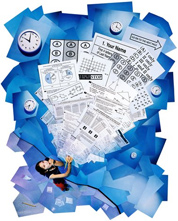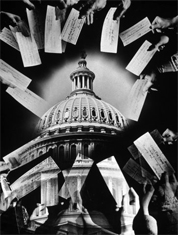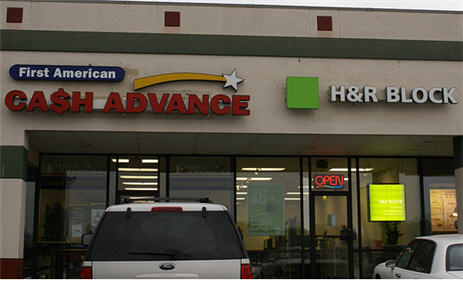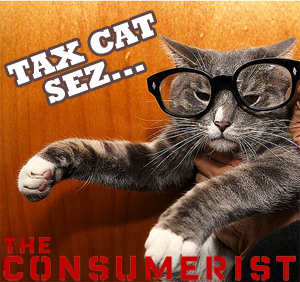../../../..//2008/02/14/finally-its-done-bush-signed/
Finally it’s done, Bush signed the legislation and the tax rebates checks are go for launch! [AP via BloggingAwayDebt]
Thanks for visiting Consumerist.com. As of October 2017, Consumerist is no longer producing new content, but feel free to browse through our archives. Here you can find 12 years worth of articles on everything from how to avoid dodgy scams to writing an effective complaint letter. Check out some of our greatest hits below, explore the categories listed on the left-hand side of the page, or head to CR.org for ratings, reviews, and consumer news.
../../../..//2008/02/14/finally-its-done-bush-signed/
Finally it’s done, Bush signed the legislation and the tax rebates checks are go for launch! [AP via BloggingAwayDebt]

To help fill New York State’s budget gap, Gov. Eliot Spitzer has revived a plan to impose sales tax on some goods purchased online that are not currently taxed, notably things bought from Amazon.com. The state estimates this will bring in $47 million a year.

Eric writes:
You’ve had a lot of press about the stimulus plan that’s about to send some cash my way. There’s been coverage all over the place, and everyone misses the most important part. What, EXACTLY, do I have to do to get this credit? I know I qualify. Do I have to send in an extra form? Is there a box I check? Am I supposed to expect the gov’t to actually do something right and take care of it themselves?
Yes. This is (probably) the easiest $600 you will ever made. Just file your taxes, sit back, and wait for the hot government scrizzle to come pouring into your mailbox.

False reports have circulated that the stimulus checks are an advance on your tax rebate and were going to cut into your tax rebate. That’s not the whole story. Yes, it’s an advance, but it’s an advance on an additional credit Congress passed for your 2008 earned income. It’s too late to do that for 2007, seeing as it’s already over. “So the government is making me borrow from myself?!?!?” No. Congress is giving your 2009 self a $600 credit, and is sending that $600 back in time by one year.

Did you know there was an index to measure misery?
Misery is defined as a state of great unhappiness and emotional distress. The economic indicator most often used to measure misery is the Misery Index. The index, created by economist Arthur Okun, adds the unemployment rate to the inflation rate. It has been in the narrow 7-to-9 range for most of the past decade, but was over 20 during the late 1970s.

I-CAN! is a web-based tax preparation tool that will file your tax return completely free of charge. I-CAN has no eligibility criteria or income restrictions and will eFile your state return for free if you live in California, Michigan, New York, Pennsylvania or Montana. It almost sounds too good to be true. So why isn’t I-CAN! a member of the IRS’ Free File Alliance?

It seems that some bottom-feeding debt collection companies—the ones who buy old debts that are frequently beyond the point where you can be sued for collection (what the FTC calls “time-barred debts”)—purchase old debts, mark them up with incredibly high penalties and fees, then “forgive” them and write them off as tax losses and send the debtors 1099-C forms—which means you have to pay taxes on the forgiven amount. If this happens to you, here are a few things you should consider first.

All across America people are collecting forms, sorting receipts, and assembling documents — all in an effort to deal with the dreaded tax man. For many, the whole prospect of filing taxes is a frightening experience, but it doesn’t have to be that way. Yahoo Finance lists seven common tax terrors and how you can deal with each of them. Their list includes:
../../../..//2008/02/08/state-farm-customers-get-to/
State Farm customers get to file their taxes for free with Turbo Tax. [State Farm]

Reader Justin writes in to tell us how to opt-out of H&R Block’s arbitration clause in their 2007 Client Service Agreement.
../../../..//2008/02/07/dnde-est-mi-reembolso-we/
¿Dónde está mi reembolso? We don’t speak Spanish, but maybe you do. The IRS’ popular “Where is my refund?” feature is now available in en Español. [IRS]

../../../..//2008/02/07/that-was-fast-the-senate/
That was fast. The Senate today passed H.R. 5140, a $167 billion economic stimulus plan, by a vote of 81-16. The final bill grants rebates to seniors and disabled veterans, but does not extend unemployment insurance or provide heating assistance to the poor. The bill will now take a quick breather in the House before sprinting down Pennsylvania Avenue for the President’s signature. [AP]

../../../..//2008/02/07/update-the-senate-passed-the/
Seniors and disabled veterans have joined the unemployed on the list of people who won’t receive help from Congress under the developing economic stimulus plan. The Senate yesterday rejected an expanded stimulus package by a single vote, meaning that they will most likely approve the House’s $146 billion plan that will send a $600 rebate check to most taxpayers. Congress will continue tweaking the package ahead of a self-imposed February 15 deadline. [U.S. Senate]
../../../..//2008/02/06/what-the-hell-the-center/
What the hell? The Center for Science in the Public Interest and the Corn Refiners Association (representing the producers of high-fructose corn syrup) actually agree on something. Both the CSPI and the CRA have sent a joint letter to San Francisco Mayor Gavin Newsom, objecting to a proposed tax that would only apply to soft drinks sweetened with HFCS. The CSPI and the CRA both agree, “the idea that high-fructose corn syrup is more harmful than sugar is an “urban myth.” [CSPI]
../../../..//2008/02/04/scammers-are-calling-up-people/
Scammers are calling up people and pretending to be from the government and here to help with getting you your tax rebate. All you have to do is give them your bank account information. [9news]

It’s February 1st and you don’t have your W2? Fear not. Tax Cat will help.

For products that don’t kill you, we usually pay 6.9%, but for some states have seen fit to tax cellphones at exorbitant rates, like Illinois’ 21.05% or New York’s 21.71%. Why? Probably because people don’t notice or complain very much and so the states get tidy chunk of extra revenue. One Forbes writer who moved from New York to L.A. was still stuck paying New York taxes, the highest in the country. When he complained, Verizon said they couldn’t do anything because they link area of primary usage to your area code. If he wanted to pay L.A. rates, he would have to get an L.A. number, and give up his New York number. Instead, he went and bought a phone in Idaho, provided an Idaho address, and switched to paperless billing. Now he enjoys the small potatoes rate of 7.71%. He admits that this “probably crosses the line.” One must also admit that cellphone taxes have crossed the line, as have cellphone companies that shortcut the Mobile Telecommunications Sourcing Act by determining the “area of primary usage” based on your area code or billing address, instead of detecting where you actually use the phone the most. Inside, a list of cellphone taxes by state.
![]()
Part of ![]()
Founded in 2005, Consumerist® is an independent source of consumer news and information published by Consumer Reports.
